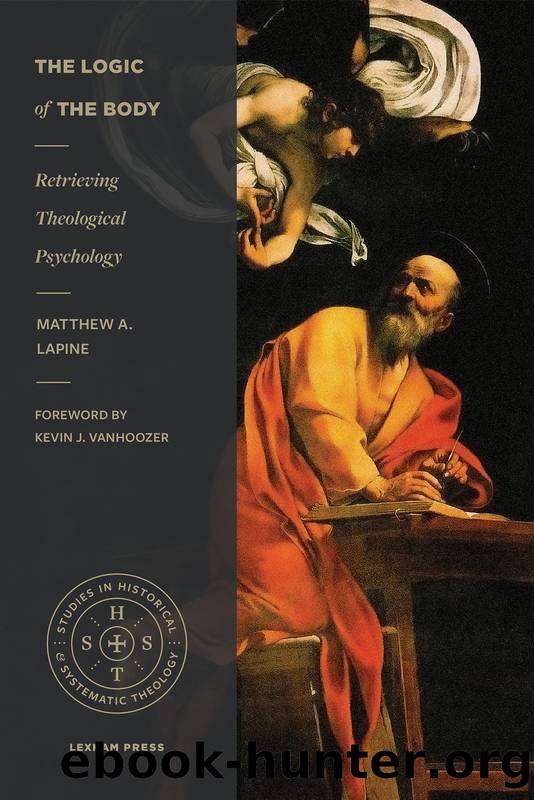The Logic of the Body by Matthew A. LaPine

Author:Matthew A. LaPine
Language: eng
Format: epub
Tags: Theology., Christianity--Psychology.
Publisher: Bellingham, WA
Published: 2020-09-15T00:00:00+00:00
Implicit Memory
A key to understanding how physiology features in conscious experience is the notion of implicit memory. We have already briefly discussed the distinction between explicit (semantic and episodic) and implicit memory. But how do these forms of memory work together in experience? How might implicit memory interfere with cognitive function? LeDoux suggests a sort of dependence relation where explicit episodic memory (experiential memory) depends on explicit semantic memory of facts, which depends on implicit memory. They are autonoetic (self-aware), noetic (aware), and a-noetic (unconscious), respectively. When we experience something, the experience is maintained in working memory for only a short period of time. If it is to be explicitly retrieved later, it must be stored via consolidation, by which LeDoux means that it is stored in long-term memory, the medial temporal lobe memory system. These memories are merely preconscious and capable of being retrieved into working memory (prefrontal cortex).79 The ease with which we retrieve a memory is related to how strongly it was encoded and what it is associated with; memories can be heightened by arousal or by repetition. The stronger the synaptic connections between the long-term and working memory systems, the easier it is to make memories conscious again. This is the basis of all learning. However, just as consciousness depends on unconscious processes, so also explicit memories have implicit correlates.80 For example, LeDoux describes how we may become conditioned even to the context of an emotional experience, which can trigger arousal in the absence of conscious cognitive processing. LeDoux writes,
Consider another example. You are walking down the street and notice someone running toward you. The person, upon reaching you, hits you on the head and steals your wallet or purse. The next time someone is running toward you, chances are a set of standard fear responses will be set into play. You will probably freeze and prepare to defend yourself, your blood pressure and heart rate will rise, your palms and feet will sweat, stress hormones will begin to flow through your bloodstream, and so on. The sight of someone running toward you has become a conditioned fear stimulus. But suppose you later find yourself on the street where you were mugged. Although there is no one running toward you, your body may still be going through its defense motions. The reason for this is that not only did you get conditioned to the immediate stimulus directly associated with the trauma (the sight of the mugger running toward you), but also to the other stimuli that just happen to have been there.81
Download
This site does not store any files on its server. We only index and link to content provided by other sites. Please contact the content providers to delete copyright contents if any and email us, we'll remove relevant links or contents immediately.
The Secret Power of Speaking God's Word by Joyce Meyer(3152)
Signature in the Cell: DNA and the Evidence for Intelligent Design by Stephen C. Meyer(3121)
Real Sex by Lauren F. Winner(3001)
The Holy Spirit by Billy Graham(2937)
The Gnostic Gospels by Pagels Elaine(2515)
Jesus by Paul Johnson(2347)
Devil, The by Almond Philip C(2322)
23:27 by H. L. Roberts(2241)
The Nativity by Geza Vermes(2220)
Chosen by God by R. C. Sproul(2155)
All Things New by John Eldredge(2149)
Angels of God: The Bible, the Church and the Heavenly Hosts by Mike Aquilina(1948)
The Return of the Gods by Erich von Daniken(1925)
Angels by Billy Graham(1915)
Knowing God by J.I. Packer(1844)
Jesus of Nazareth by Joseph Ratzinger(1797)
The Gnostic Gospel of St. Thomas by Tau Malachi(1779)
How To Be Born Again by Billy Graham(1775)
Evidence of the Afterlife by Jeffrey Long(1773)
